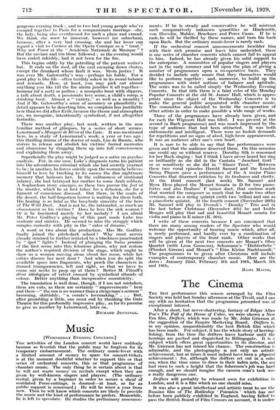Music
[WEDNESDAY EVENING CONCERTS.] THE activities of the London concert world have suddenly become so feverish that the public may be forgiven for its temporary embarrassment. The ordinary music-lover with a limited amount of money to spare for concert-tickets is at the moment doubtful whether to support this or that series of orchestral concerts, this or that programme of chamber music. The only thing he is certain about is that he will not waste money on recitals except when they are given by well-known singers and players. (The ordinary recital, given by a beginner in order to secure- a sheaf of mutilated Press-cuttings, is doomed—at least, so far as public support is concerned.) He will be wiser a year from now. Then he will know which concerts are likely to provide the music and the kind of performance he prefers. Meanwhile, he is left to speculate. He studies the preliminary announce-
ments. If he is steady- and- conservative he ,:will mistrust such comparatively unknown quantities as Hindemith, von Hoesslin; Mahler, Bruckner, and Perez Casas. If he is rash, he will be thrilled by these names, and turn his back upon Bach. But the ordinary music-lover is rarely rash.
If the orchestral concert announcements bewilder • him with their rich promise and leave him undecided, there is one series of chamber concerts which cannot fail to appeal to him. Indeed, he has already given his solid support to the enterprise. A committee of popular singers and players met in the early summer and hit upon the plan of giving a number of programmes upon a co-operative basis. They decided to include only music that they themselves would like to perform together; and, moreover, to build up the programmes with strict notions of balance •and aptitude. The series was to be called simply the Wednesday Evening Concerts. In that title there is a faint echo of the Monday Popular Concerts at the old St. James' Hall, which is appro- priate since the object of the Wednesday Concerts is to make the general public acquainted with chamber music. The committee also • decided to • invite - the co-operation of other artists in order to make possible a wide range of works.
Three of the programmes have already been given, and for each the Wigmore Hall was filled. I was present at the second (a Bach programme) and was much impressed by the type of audience that had been attracted. It was both enthusiastic and intelligent. There were no foolish demands for repetitions and no signs of aloof, high-brow appraisement. It was an audience after one's own heart.
It is rare to be able to say that fine performances were given and that the audience deserved them. On this occasion one could say so without reserve. Dorothy Silk is renowned for her Bach singing : but I think I have never heard her sing so brilliantly as she did in the Cantata " Jauchzet Gott ' or so - sensitively as she did in " Siisser Trost." Between these two vocal episodes Harold Samuel and the London String Players gave a performance of the A major Piano Concerto that disarmed criticism by its freshness and clarity. At the third concert - (last week) Mr. Samuel and Myra Hess played the Mozart Sonata in D for two piano- fortes and also Brahms' F minor duet, that curious work that worried the composer so much that he made two other versions, one as a string quintet (with two 'cellos) and one as: a pianoforte quintet. At the fourth concert (November 20th) Mr. Samuel will play in Dvorak's " Durnky " Trio and in the last -before Christmas (December 4th) he- and Isolde Menges will play that sad and beautiful Mozart sonata for violin and piano in E minor (K. 304).
I write of these concerts because I am convinced that there are many among readers of the Spectator who would welcome the opportunity of hearing music which, after all, is rarely performed, and hardly ever by a combination of singers and players of the front rank. Other works that will be given at the next two concerts are Mozart's Oboe Quartet (with Leon Goossens), Schumann's "Dichterliebe " (Plunket Greene) and Mozart's " Eine Kleine Na.chtmusik." The programmes to be given after Christmas will include examples of contemporary chamber music. Here are the dates : January 22nd, February 5th and 19th, March 5th and 19th.
BASIL MAINE.








































 Previous page
Previous page